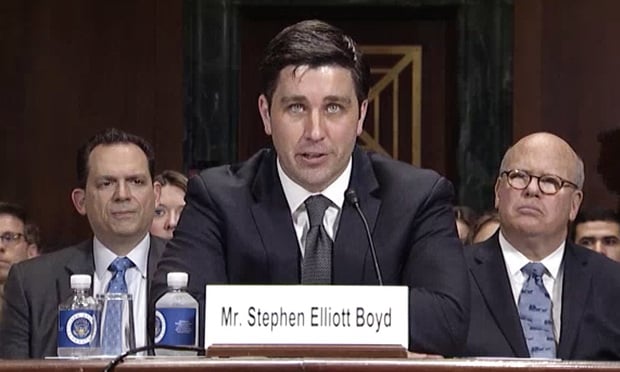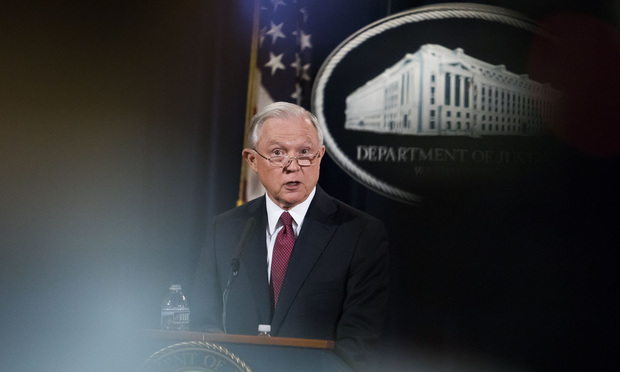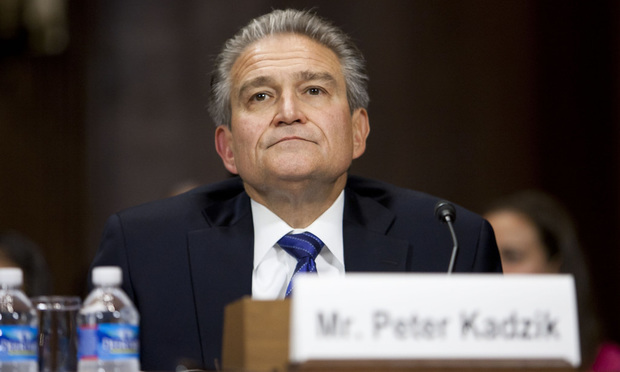In the 'Chaos': Stephen Boyd Is DOJ's Point Man as Democrats Dial Up Pressure
“None of us saw at that early stage the chaos Stephen would have to wade through,” said Ronald Weich, a former head of DOJ's office of legislative affairs.
May 17, 2019 at 11:18 AM
11 minute read
 Stephen Boyd testifies before the Senate Judiciary Committee to be an assistant attorney general for legislative affairs, on May 24, 2017. Photo via Senate Judiciary Committee.
Stephen Boyd testifies before the Senate Judiciary Committee to be an assistant attorney general for legislative affairs, on May 24, 2017. Photo via Senate Judiciary Committee.
On the evening of May 18, 2017, as he awaited confirmation to serve as the U.S. Justice Department's lead liaison to Congress, Stephen Boyd walked into a bar on Pennsylvania Avenue to meet his predecessors.
Over drinks at the Tadich Grill, a seafood restaurant that would close within the year, the group warned Boyd of pitfalls and shared strategies for serving as “chief javelin catcher for the Justice Department,” as one of the attendees later described the role of assistant attorney general for legislative affairs.
They also told stories.
William Moschella, a partner at Brownstein Hyatt Farber Schreck and former top Justice Department official in the George W. Bush administration, recalled the fallout over the firings of U.S. attorneys and various congressional inquiries into the war on terror. An assistant attorney general from the Obama administration, Ronald Weich, recounted the congressional inquiry into a botched drug-trafficking sting, Operation Fast and Furious, and the document dispute that would lead House Republicans to hold then-Attorney General Eric Holder in contempt.
“None of us saw at that early stage the chaos Stephen would have to wade through,” said Weich, now dean of the University of Baltimore School of Law.
Indeed, two years later, Boyd has found himself mired in his own standoff with Congress, tested like never before as tensions between the Justice Department and House Democrats have reached new heights.
Boyd, 40, declined to comment about his role as the Justice Department's chief ambassador to Congress, a position that has put him at the center of negotiations over House Democrats' demands for documents and testimony from William Barr, the attorney general, about the special counsel's Russia investigation.
Career on Capitol Hill, and Alabama Roots
Boyd arrived at the Justice Department after a 12-year career on Capitol Hill that began in the Senate office of Jeff Sessions.
An Alabama native who named his labrador Atticus Finch—after the lawyer in “To Kill A Mockingbird”—he was hired in 2004 out of the University of Alabama School of Law and rose to become Sessions's communications director. In 2011, he left Sessions's office to serve as chief of staff to U.S. Rep. Martha Roby, at the time a freshman Republican from his home state.
But he remained part of “Team Sessions,” as one former colleague referred to the network of former aides, and volunteered after Trump's election to help his old boss through his confirmation as Trump's first attorney general.
Sessions was ousted two years later after spending much of his tenure in the crosshairs of the president, who quickly soured on him over his decision to recuse himself from the Russia investigation. Since then, several of Sessions's top advisers have left the Justice Department.
 Former U.S. Attorney General Jeff Sessions. Credit: Diego M. Radzinschi / ALM
Former U.S. Attorney General Jeff Sessions. Credit: Diego M. Radzinschi / ALMBoyd, however, has stuck it out.
When Sessions returned to the Justice Department for his belated farewell ceremony in March, Boyd was the only assistant attorney general seated on stage with him inside the department's Great Hall.
Boyd's role has been elevated again in recent weeks, thrust to the fore as the Justice Department and House Democrats have wrangled over Special Counsel Robert Mueller III's report on Russia's interference in the 2016 election and Trump's efforts to end the investigation.
Last week, the House Judiciary Committee voted to hold Barr in contempt over his refusal to furnish a full, unredacted copy of Mueller's 448-page report. Boyd had played a role in the negotiations with House leaders, agreeing to make all but the grand jury information—”98.5 percent” of the report, he said in a letter to the House—available to a dozen lawmakers, along with two members of each of their respective staffs.
Those concessions, Boyd said, came in addition to what he described as an “extraordinary” accommodation: Barr's decision to release the Mueller report in the first place.
The day before the party-line contempt vote, the Justice Department negotiated into the evening with House Democrats, urging them to stand down.
The talks were punctuated that night with a letter signed by Boyd, warning the House Judiciary Committee that the Justice Department would advise Trump to assert executive privilege over Mueller's findings in the face of the panel's threat to hold Barr in contempt.
U.S. Rep. Jerrold Nadler of New York, chairman of the House Judiciary Committee, said the assertion of executive privilege marked a “clear escalation in the Trump administration's blanket defiance” of congressional subpoenas.
“I hope that the department will think better of this last minute outburst and return to negotiations,” Nadler wrote. “As a co-equal branch of government, we must have access to the materials that we need to fulfill our constitutional responsibilities in a manner consistent with past precedent.”
Representatives from the House Judiciary Committee did not respond to a request for comment.
Other disputes have focused on the terms of Justice Department testimony.
In April, Boyd's office opposed the House Oversight and Reform Committee's plan to forbid an administration lawyer from sitting in on the deposition of John Gore, a top official in the Justice Department's civil rights division, whom Democrats wanted to question about the addition of a citizenship question to the 2020 census. Boyd, challenging a committee rule that broadly bars federal agency lawyers from attending depositions of government officials, said Barr would not allow Gore to testify unless a Justice Department lawyer was allowed in the room. Gore did not appear for the deposition.
The next week, Barr declined to appear for a hearing on the Mueller report after the House Judiciary Committee took steps to allow staff to question the attorney general. A Justice Department spokeswoman, Kerri Kupec, said the committee's “insistence on having staff question the attorney general, a Senate-confirmed cabinet member, is inappropriate.”
Shepherding Nominees, and Pushing Policy
With about 30 full-time staff, Boyd's office is small in the realm of Main Justice. The office coordinates with about 40 other congressional affairs staff at the FBI and other components of the Justice Department.
Boyd's office is responsible for shepherding nominees for Justice Department roles through the confirmation process, responding to congressional inquiries and pushing the attorney general's legislative priorities. A separate part of the Justice Department, the Office of Legal Policy, handles judicial nominations.
When Boyd took the helm of the legislative affairs office, he was well-versed in the ways of Congress, but he arrived with minimal experience practicing law. In his Senate questionnaire, prepared as part of his confirmation process, Boyd said he had “never practiced law” or sat for a bar exam. He was a summer associate twice during law school at firms in Birmingham.
Because he'd only served in the personal offices of lawmakers, rather than as a staff counsel for a committee, Boyd also entered the role without experience in the types of interbranch negotiations he now oversees.
 Peter Kadzik at his confirmation hearing in 2013. Photo by Diego M. Radzinschi / NLJ
Peter Kadzik at his confirmation hearing in 2013. Photo by Diego M. Radzinschi / NLJ“Legal experience and litigation experience are all part of negotiations. Such experience might have given him a better leg up on negotiations with the Hill,” said Venable partner Peter Kadzik, who served as assistant attorney general for legislative affairs during the Obama administration after three decades in private practice.
“You get decent experience in personal offices, but at the end of the day, the negotiations are with committee staff,” he said.
The Justice Department's recent clashes with Congress have come amid Trump's defiance of House Democrats' demands for information. But even during the first two years of the Trump administration, when Republicans controlled both chambers of Congress, Boyd's time as assistant attorney general was anything but tranquil.
As Senate Republicans raced to confirm judges, nominees to lead several Justice Department divisions languished. More than a year into the administration, Trump's picks to lead the Justice Department's civil, criminal, environment and civil rights divisions were still awaiting confirmation. “Unfortunately only two of the seven litigating divisions of the Department of Justice have Senate-confirmed leaders,” then-Deputy Attorney General Rod Rosenstein griped in May 2018, as he became increasingly vocal about the delays.
In interviews, former Justice Department and congressional lawyers attributed the delays to what they characterized as forces beyond Boyd's control, namely procedural hurdles in the Senate and Republicans' prioritization of judicial nominees.
On the legislative front, Boyd's office pressed for the reauthorization of a controversial electronic surveillance program, enlisting then-Associate Attorney General Rachel Brand in the effort. Brand had served under the Obama administration as a member of the Privacy and Civil Liberties Oversight Board, which conducted a review of the program in 2016. The House and Senate voted in January 2018 to reauthorize the National Security Agency's warrantless surveillance program for six years.
And then there was U.S. Rep. Devin Nunes, the California Republican.
As former chairman of the House Intelligence Committee, Nunes had been leading the panel's investigation into Russian interference in the 2016 election and allegations of surveillance abuses.
As they pushed back against demands for sensitive information, some of it related to ongoing investigations, Boyd and his counterparts at other law enforcement and intelligence agencies were hampered by the president's support of Nunes' efforts, said Greg Brower, who served as the FBI's chief congressional liaison during that period.
“What was interesting politically about that period was that we had a Republican president who was essentially at odds with his own Republican appointees at DOJ and [the Office of the Director of National Intelligence] about how to respond to certain congressional requests by Republicans. It wasn't a Republican-vs.-Democrat disagreement,” said Brower, a former U.S. attorney in the George W. Bush administration who joined Brownstein Hyatt Farber Schreck last year as a partner.
With the White House apparently unwilling to intervene with congressional leaders, the Justice Department turned over more than it was comfortable providing, Brower said. The lack of “top cover” from the White House, he said, “led to a lot of the unprecedented sharing of information with Capitol Hill” that concerned close allies.
During negotiations, Boyd grew increasingly sophisticated on national security issues and was generally deferential to career officials, Brower recalled. As a longtime congressional aide, Boyd was in constant search for compromise.
“Past assistant attorneys general for OLA will all tell you they had their one unprecedented challenging situation with the Hill. Every administration has that one thing or a couple things. With all due respect to the challenges those past AAGs faced, I don't know if anyone has ever faced what Stephen is facing,” Brower said. “We've never had a president attack law enforcement—the DOJ and FBI—like this. Stephen has had to stand in the middle of it all and defend his client—DOJ—and the rule of law, against unprecedented attacks. I think he's done very well in very trying circumstances.”
Read more:
Barr Was Just Held in Contempt, as the Case Against Eric Holder Settles
William Barr Has Reached That Point Where House Dems Explore 'All of the Options'
Mueller's Restraint, Barr's Press Conference: Here's What Lawyers Are Saying
DOJ Lawyer Stands Up Dems—and Puts Obscure House Rule in Spotlight
This content has been archived. It is available through our partners, LexisNexis® and Bloomberg Law.
To view this content, please continue to their sites.
Not a Lexis Subscriber?
Subscribe Now
Not a Bloomberg Law Subscriber?
Subscribe Now
NOT FOR REPRINT
© 2025 ALM Global, LLC, All Rights Reserved. Request academic re-use from www.copyright.com. All other uses, submit a request to [email protected]. For more information visit Asset & Logo Licensing.
You Might Like
View All
US Judge Cannon Blocks DOJ From Releasing Final Report in Trump Documents Probe
3 minute read
Private Equity Giant KKR Refiles SDNY Countersuit in DOJ Premerger Filing Row
3 minute read
Several Big Law Firms Saw Year-Over-Year Lobbying Revenue Growth in 2024
4 minute readTrending Stories
- 1Courts Demonstrate Growing Willingness to Sanction Courtroom Misuse of AI
- 2The New Rules of AI: Part 1—Managing Risk
- 3Change Is Coming to the EEOC—But Not Overnight
- 4Med Mal Defense Win Stands as State Appeals Court Rejects Arguments Over Blocked Cross-Examination
- 5Rejecting 'Blind Adherence to Outdated Precedent,’ US Judge Goes His Own Way on Attorney Fees
Who Got The Work
J. Brugh Lower of Gibbons has entered an appearance for industrial equipment supplier Devco Corporation in a pending trademark infringement lawsuit. The suit, accusing the defendant of selling knock-off Graco products, was filed Dec. 18 in New Jersey District Court by Rivkin Radler on behalf of Graco Inc. and Graco Minnesota. The case, assigned to U.S. District Judge Zahid N. Quraishi, is 3:24-cv-11294, Graco Inc. et al v. Devco Corporation.
Who Got The Work
Rebecca Maller-Stein and Kent A. Yalowitz of Arnold & Porter Kaye Scholer have entered their appearances for Hanaco Venture Capital and its executives, Lior Prosor and David Frankel, in a pending securities lawsuit. The action, filed on Dec. 24 in New York Southern District Court by Zell, Aron & Co. on behalf of Goldeneye Advisors, accuses the defendants of negligently and fraudulently managing the plaintiff's $1 million investment. The case, assigned to U.S. District Judge Vernon S. Broderick, is 1:24-cv-09918, Goldeneye Advisors, LLC v. Hanaco Venture Capital, Ltd. et al.
Who Got The Work
Attorneys from A&O Shearman has stepped in as defense counsel for Toronto-Dominion Bank and other defendants in a pending securities class action. The suit, filed Dec. 11 in New York Southern District Court by Bleichmar Fonti & Auld, accuses the defendants of concealing the bank's 'pervasive' deficiencies in regards to its compliance with the Bank Secrecy Act and the quality of its anti-money laundering controls. The case, assigned to U.S. District Judge Arun Subramanian, is 1:24-cv-09445, Gonzalez v. The Toronto-Dominion Bank et al.
Who Got The Work
Crown Castle International, a Pennsylvania company providing shared communications infrastructure, has turned to Luke D. Wolf of Gordon Rees Scully Mansukhani to fend off a pending breach-of-contract lawsuit. The court action, filed Nov. 25 in Michigan Eastern District Court by Hooper Hathaway PC on behalf of The Town Residences LLC, accuses Crown Castle of failing to transfer approximately $30,000 in utility payments from T-Mobile in breach of a roof-top lease and assignment agreement. The case, assigned to U.S. District Judge Susan K. Declercq, is 2:24-cv-13131, The Town Residences LLC v. T-Mobile US, Inc. et al.
Who Got The Work
Wilfred P. Coronato and Daniel M. Schwartz of McCarter & English have stepped in as defense counsel to Electrolux Home Products Inc. in a pending product liability lawsuit. The court action, filed Nov. 26 in New York Eastern District Court by Poulos Lopiccolo PC and Nagel Rice LLP on behalf of David Stern, alleges that the defendant's refrigerators’ drawers and shelving repeatedly break and fall apart within months after purchase. The case, assigned to U.S. District Judge Joan M. Azrack, is 2:24-cv-08204, Stern v. Electrolux Home Products, Inc.











